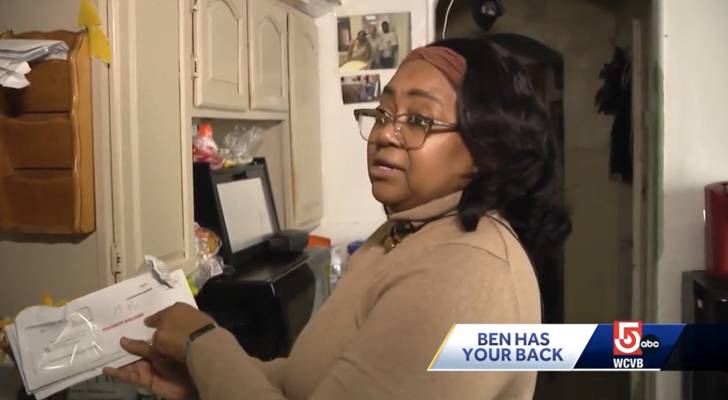
Teresa Lawrence-Coston got a shock recently when she opened her mailbox and found a stack of envelopes from her electric company. Each one had a bill with the same date of issue — March 17 — but included charges across 10 months of service totaling $3,327.52, according to WCVB NewsCenter 5.
“I’m like, ‘This can’t be real,’” she recalled to the local broadcaster in a story published April 24. “I didn’t receive any cutoff notices. No late status. Nothing. Just one day, out of the blue, 10 statements.”
Don’t miss
- I’m 49 years old and have nothing saved for retirement — what should I do? Don’t panic. Here are 5 of the easiest ways you can catch up (and fast)
- Gain potential quarterly income through this $1B private real estate fund — even if you’re not a millionaire. Here’s how to get started with as little as $10
- You’re probably already overpaying for this 1 ‘must-have’ expense — and thanks to Trump’s tariffs, your monthly bill could soar even higher. Here’s how 2 minutes can protect your wallet right now
Other utility customers in Massachusetts shared stories with NewsCenter 5 about being slammed with massive, surprise bills, totaling thousands of dollars, after not being charged regularly for months. The complaints centered around two companies: Eversource and National Grid.
“How do [they] reconcile their accounts?” Lawrence-Coston asked. “What are [they] doing over there that they didn’t realize they weren’t invoicing me?”
‘I gave up trying’
Brian Pratt, a National Grid customer, says he went nearly a year without an electric bill in 2022 and 2023. Suddenly, he received two bills dated April 12 and April 13, 2023, followed by a much larger bill three weeks later totaling $1,092.47.
“I had reached out to them via email, via phone, and I got the same runaround, ‘Oh, we’re working on it.’ And I gave up trying,” he told NewsCenter 5. “We want to pay our bills on time. We don’t want surprise bills nine, 10 months later.”
Diane Kimball says she hadn’t gotten an electric bill from National Grid since last August, despite calling the company and having a technician inspect her meter — twice — only to be told it was fine.
“They have a poor billing practice, or there’s something wrong in the company, but they need to correct it,” she told NewsCenter 5. “I pay my bills. I owe the money. I don’t want my power shut off.”
Read more: Want an extra $1,300,000 when you retire? Dave Ramsey says this 7-step plan ‘works every single time’ to kill debt, get rich in America — and that ‘anyone’ can do it
The broadcaster says utility customers reached out to them after reports National Grid failed to bill thousands of gas customers this past winter. On March 31, the Massachusetts Department of Public Utilities (DPU) ordered the company not to collect charges older than 60 days if bills were not sent in a timely manner, pointing to a rule established in 2013. NewsCenter 5 says a DPU spokesperson confirmed this rule applies to all utility customers in the state. Customers have to contact their utility for relief. If there’s still an issue, they can file a complaint with the DPU’s consumer division.
Pratt says he pushed National Grid for a credit and received a $1,500 refund. Kimball says she’s in the process of having old charges waived. Lawrence-Coston says she had eight out of 10 months’ worth of charges cleared by Eversource.
“They need to be held accountable for their error,” Lawrence-Coston said. “This had nothing to do with me. It was not my fault that their system wasn’t working.”
According to NewsCenter 5, Eversource issued a statement saying it was “already working to resolve each of the issues in question” before media inquiries. The broadcaster also quoted a National Grid spokesperson: “We sincerely apologize to any customers experiencing billing delays and remain focused on resolving any long-term billing issues.”
Weigh the risks of other energy options
In Massachusetts, consumers have the option to shop for third-party energy suppliers, which could lower their electricity bills. There are some risks, though, so be aware.
There have been reports in the past where customers who switched service providers paid more over the course of a year. It’s important to read the fine print of a contract when it comes to billing practices, rate changes and fees.
The Office of the Attorney General also received complaints of aggressive and deceptive tactics by suppliers. Keep your eyes open for shifty sales tactics.
Massachusetts residents can visit Energy Switch Massachusetts to compare rates and plans by zip code. Consider looking for fixed-rate contracts, transparent terms and checking for any termination fees. Ensure that you’re getting a deal that suits both your budget and energy needs.
What to read next
- Millions of Americans now sit on a stunning $35 trillion in home equity — here’s 1 new way to invest in responsible US homeowners while targeting a 14%-17% IRR
- Robert Kiyosaki warns of a ‘Greater Depression’ coming to the US — with millions of Americans going poor. But he says these 2 ‘easy-money’ assets will bring in ‘great wealth’. How to get in now
- Here are 5 ‘must have’ items that Americans (almost) always overpay for — and very quickly regret. How many are hurting you?
This article provides information only and should not be construed as advice. It is provided without warranty of any kind.